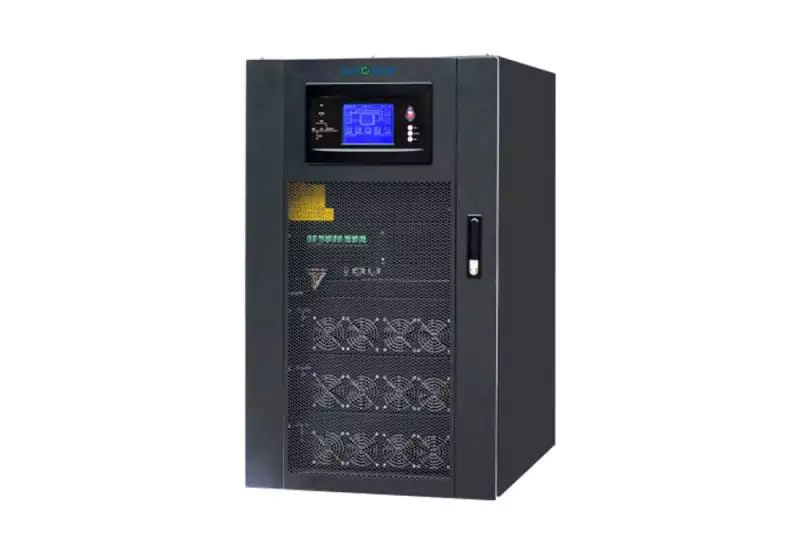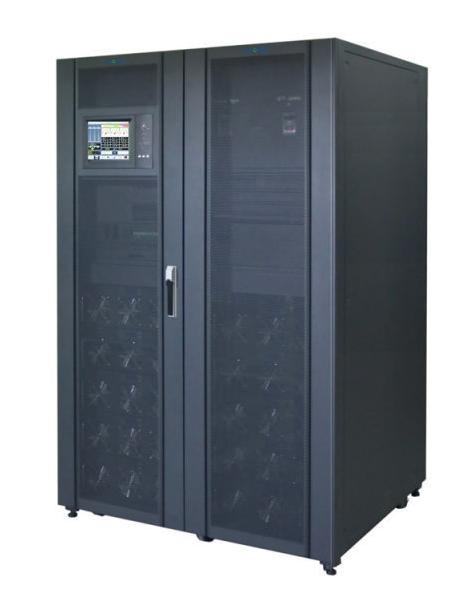

A modular UPS system is a battery design with a flexible infrastructure, which allows users to change the capacity of the system. The device usually consists of individual blocks of power that can be easily connected or disconnected depending on the user’s needs. Additionally, such devices are frequently created with hot-swappable elements, which do not require the system to be turned off if maintenance or modernization is needed. This type of generator can help the user optimize the TCP, as it allows allocation of the required amount of resources.
Conventional UPS systems are based on the definition as they are traditional models of uninterruptible power supplies with fixed capacities. These types of systems represent a single unit where all the necessary components are mounted. Undoubtedly, such an arrangement is simple and useful in terms of providing power backup solutions. However, the existing facility’s relatively scarce scalability may be disadvantageous as businesses expand and require an increasing amount of power supply. As for the general characteristics of these UPS systems, it can be noted that they are relatively simpler to set up once in comparison with modular solutions, even advanced configurations. However, with time, they will be accompanied by higher costs conditioned by the growing size of a company and its additional energy requirements.
Modular UPS systems are notable for their scalability. When power modules are added, the capability expands. It is possible to have N+X redundancy, which means that if one of the modules does not work, the overall systems remain operational. With the number of possible units that can be added, this feature is essential for maintaining uptime when the load is at a maximum. Part of this advantage means that the limited number of modules containing reactive power will be active. Thus, pragmatic UPS scalability translates into more optimal power usage, resulting in reduced expenses due to wasted capacity.
In comparison with a modular UPS, traditional UPS are fixed and require the replacement of the whole box, in case the capacity is insufficient. This requirement puts pressure on businesses since, if the company grows, the current UPS may not be sufficient. While the new UPS should be bigger to accommodate new technology and greater power needs, the transition may be costly. Another disadvantage of the traditional UPS is that the user is paying for capacity there is no use since the system is not expanding. If a business contemplates growth, it should understand that traditional UPS will not be as flexible and will offer multiple constraints on power supply management.
Modular options of UPS boast superior maintainability due to their construction. Separate modules of power may be replaced or fixed without turning the system off, thus allowing the users to avoid downtime. This has a direct positive effect on maintainability and means that improvements and repairs can be performed without interruptions in the protection of critical systems. Moreover, manufacturers such as, for example, ZLPOWER have developed Сomprehensive functions for online monitoring in real-time including status, event, and alarm monitoring functions as well as historical data analysis. As a result, maintenance becomes not only easier but also more proactive, which further enhances the overall uptime and reliability.
Most of the current UPS systems are modular and, therefore, much easier to service. If a single module or part of a module fails, a technician can replace it, and the unit can continue operating. The maintenance of the whole system can be much more problematic, particularly in some earlier systems that may require the entire UPS system to be taken offline. The cost associated with the development and maintenance of a new module of a standard system is also likely to be quite low. Thus, the cost and lead time associated with ramps and depreciation overhead costs are, potentially, the most significant factors to be considered in this situation. At the same time, maintenance of the existing UPS system can mean more downtime and higher costs. Potentially, maintenance costs can be even higher if an operator requires the assistance of the manufacturer.
Modular UPS systems, like the ones offered by ZLPOWER, are known for their superior energy performance compared to conventional UPS systems. This is achieved through smarter load management and the ability to adjust power based on current needs. ZLPOWER systems incorporate a smart sleep function that reduces power consumption when a module is not in use. This, along with advanced charging and battery management, not only ensures efficient battery operation but also extends the lifespan of the batteries. As a result, operational costs are reduced, making modular UPS systems a cost-effective choice for businesses.
Most non-modular UPS have bigger than necessary losses. Specifically, because the presented technology is fixed and does not take into consideration the low load, the system will constantly work at 100% of its output. Due to the waste of energy that the device becomes, the lack of efficiency is likely to produce higher energy bills over time. This is especially problematic for companies with shifting electricity loads. Moreover, it generates an unwanted amount of heat creating additional costs for developing new systems of cooling.
Modular uninterruptible power supply systems are very effective for data centers, large industrial enterprises, and enterprises that may need more or less power. The capacitive flexibility of a UPS is one of the strengths in choosing installation in environments where the need for electricity increases unpredictably or decreases, thus providing organizations with immediate response solutions. Installation UPS products are suitable for the telecommunications, healthcare industry, and security of financial services. High efficiency and proactive maintenance measures are used.
On the other hand, my advice would be that a conventional UPS system will still be effective in the smaller power setup that is growing and the power needs are still predictable. This is because the Inverters do not require to be individually replaced at the virtual systems levels. The conventional UPS will be ideal for scenarios where the user is not bothered about maintaining a mix of backup power sources for minimal UPS power backup requirements.
ZLPOWER and Their Other Products

ZLPOWER is a renowned manufacturer in the power solution field providing modular UPS systems and conventional UPS technology. Being dedicated to superior quality and reliability, all the company’s products are specially designed to respond to the needs of various industries and businesses. Given the whole variety of uninterruptible power supplies manufactured by ZLPOWER, customers can select the best option suitable for them. In addition, the company maintains competitive advantages owing to manufacturing being technology-oriented and customer-centered.
ZLPOWER is one of the top manufacturers of UPS systems, but the company also offers a variety of solar inverters that increase its capacity to deliver a comprehensive power solution. Most of these products are particularly effective because they are designed to maximize energy conversion, so they are useful for firms that implement new trends in using energy sources. When combined with the company’s modular UPS products, they help managers of businesses improve the quality of their services by decreasing the energy required for their operations and increasing sustainability. These solar inverters are equipped with the most advanced features, which assist in increasing their reliability and efficiency, and, in turn, help a company save its costs in this area in the long term. Thus, the manufacturer can be described as one aligning its businesses with the most recent trends and demands of modern businesses.
ZLPOWER Modular UPS systems and solar inverter solutions provided by ZLPOWER unite smart monitoring and intelligent management, thus enabling active maintenance and boosting performance. The developer demonstrates that the right way to grow in today’s world is to constantly invest in R&D and develop solutions that do not just meet but surpass the existing requirements and the established industry standard. By offering components of the energy management system, such as modular UPS systems and solar inverters, ZLPOWER shows that it can supply a broad range of customers operating in different sectors.